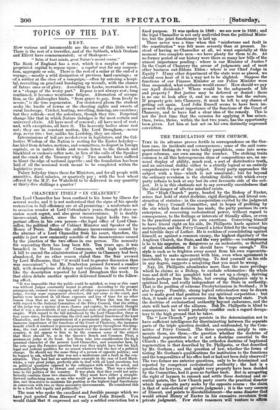CHANCERY ITSELF " IN CHANCERY."
-Tim Lord Chancellor has been confined to his home by illness for several weeks' and it is not understood that the signs of his speedy restoration to full efficiency are at all promising : a misfortune not to occasion wonder at Lord Cottenham's years, though it does oc- casion much regret., and also great inconvenience. It is doubly inconvenient, indeed, since the veteran legist holds two im- portant offices in his own person—the legal office of Lord Chan- cellor, the political office of Cabinet Minister and Speaker of the House of Peers. Besides the ordinary inconvenience caused by .the absence of a Lord Chancellor from his court, therefore, the public is just now eminently sensible of the inconvenience caused by the junction of the two offices in one person. The necessity for separating them has long been felt. Ten years ago, it was broached in the House of Commons, with high authority. A bill to amend the administration of justice in Chancery had been abandoned, for no other reason stated than the fear avowed by Lord Melbourne, that " it would lead to greater discussion than was convenient " ; but Mr. Pemberton pressed forward a smaller bill, with descriptions of delays and vexations in the court very like the description repeated by Lord Brougham this week. In that olden debate another speaker delivered himself to the follow- ingeffect. "It was impossible that the public could be satisfied, so long as this court was without judges constantly bound to attend. According to the present arrangement, counsel were engaged, and all other expenses incurred, but the judge, having some engagement elsewhere, did not come to the court, and parties were involved in all these expenses and loss of time for no other reason than that no one was bound to come. When this was the case with regard to the Judicial Committee of the Privy .Council, that the sitting of the judge was a matter of more chance and caprice, he certainly thought that it was a discreditable if not a disgraceful state of the great courts of this empire. With regard to the bill introduced by the Lord Chancellor, three or four years since, for disconnecting the civil and political functions of the Lord Chancellor, and for the appointment of a permanent judge, considering the immense importance of the functions of the Court of Chancery, the immense benefit which it rendered to persons possessing property throughout this king- dom, the vast control which it exercised over the monied interests of the country, it did appear to him to be the common sense of the subject that there should be, as in the Queen's Bench and Common Pleas, a permanent judge at its head. Let them take into consideration the high personal character of the present Lord Chancellor, and remember how, by the vote upon the Jamaica question last year they might have lost his high legal and judicial qualities for no reason whatever but the fact of a political change. He should say the same thing of a person of oppositepolitics ; and he begged to ask, whether this was not a misfortune and a fault in the con- stitution. They had had an unfortunate example in the ease of Lord Hard- wicke, a very great judge, perfectly able to deal with all legal questions, but on political questions opposed to the colleagues with whom he acted, and continually labouring to thwart and overthrow them. That was a misfor- tune to the politics of the country. It was plain that they could not satis- factorily combine these two characters. They must have either a straight- forward unflinching man, or one who would go between both political par- ties, and thus strive to maintain his position as the highest legal functionary in connexion with two or three successive Governments. He considered this to be a fault both legally and politically."
The man who spoke the excellent and forcible passage which we havejust quoted from Hansard was Lord John Russell. You 'would think 'that it expressed not only a settled conviction but a
fixed purpose. It was spoken in 1840: we are now in 1850; and the legal Chancellor is not only undivided from the political Minis- ter, but the joint functionary is laid up. There never was a time when this " misfortune and fault in the constitution" was felt more severely than at present. In- stead of having no Chancellor at all, we want especially at this moment two complete men—we have plenty for them to do. At no former period of our history were there so many law bills of the utmost importance pending : where is our Minister of Justice ? In the Court of Chancery the arrear of judgments and of most other business out-Eldons Eldon : where is our Chief Judge is
Equity ? If any other department of the state were so , we should soon hear of it in a way not to be slighted. Suppose the functions of our Finance Minister or our Police Minister were thus suspended, what confusion would ensue! How should we pay our April dividends ? Where would be the safeguards of life and property ? But justice may be deferred or denied : there is no one to look after it, and no one to care but the suitors. If property gets into Chancery, it must be left to any chance of getting out again. Lord John Russell seems to have been im- pressed with the great importance of the functions of the Court of Chancery, and to have had a clear idea of the remedy. This is not the first time that the occasion for applying it has arisen. Once, twice, thrice, within the last two years, has the opportunity been given. Let him at last act on his own distinctly expressed conviction.


























 Previous page
Previous page